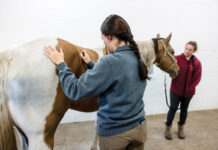On Aug. 12, Testament, a fit 4-year-old Thoroughbred, collapsed near the winner’s circle at Saratoga Race Course in New York after suffering from heat exhaustion. The temperature in Saratoga Springs was 82 degrees that day, with the humidity at 49 percent. The day was just hot enough and the competition fierce enough that the young gelding fell … and then fell again.
Luckily, Testament is making a recovery, but it doesn’t always turn out so well. Left unchecked, Testament’s serious bout with heat exhaustion may have led to hyperthermia.
Weather conditions that render high temperatures and high humidity are primary factors that can trigger hyperthermia. Horses at work are most at risk, but so are stabled horses that don’t have adequate ventilation.
- Signs of heat exhaustion in horses include:
- Weakness
- Rapid breathing
- Elevated body temperature (105-108 F)
- Muscle tremors
- Heavy sweating
- Collapse
- Signs of heat stroke in horses:
- Rapid deep breathing followed by collapse
- Extreme body temperature (115 F)
- Death is likely
The biggest difference between heat stroke and heat exhaustion is the absence of sweat in horses suffering from heat stroke. A horse’s heat-regulating systems, which include the ability to sweat, effectively shut down during heat stroke.
The best first-aid treatment for both heat exhaustion and heat stroke is to reduce the horse’s body temperature—fast. Spray the horse with cold water; use ice if it’s available. Place fans in front of the horse if possible and call your veterinarian out to administer fluids and provide additional treatment as needed.
Hyperthermia is preventable. Don’t exercise your horse during periods of extreme heat and humidity. Instead, house him in an area that receives sufficient breeze—preferably a shady pasture that gets some wind. Provide abundant clean, cool water for him to drink. Let him eat as normal and provide a free-choice salt block as well.
Remember, even racing-fit horses can succumb to heat exhaustion and heat stroke.






Moving down to Texas from Michigan I have had to deal with heat indexes that are unbearable and a lot of people down here just dont seem to understand that you have got to ride early mornings or evening down here, my horses are native to michigan so it has been a big adaption, people who relocvate like we did should consider these factors and I hope they see this article.
Remember, it’s also important to know the signs of heat related illnesses in humans too. Also, if it is too hot outside for you, then it is more than likely too hot for your horse. If you or your horse fell too overheated or tired, get some cold water for the both of you and call it a day.